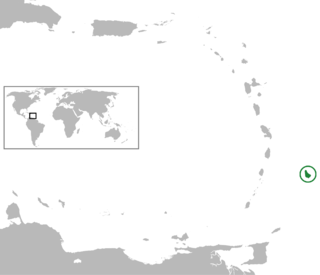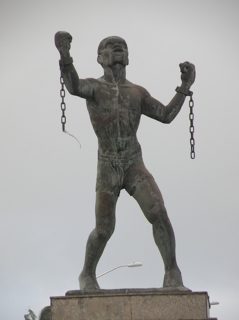
Barbados is an island country in the Lesser Antilles of the West Indies, in the Caribbean region of North America. It is 34 kilometres in length and up to 23 km (14 mi) in width, covering an area of 432 km2 (167 sq mi). It is situated in the western area of the North Atlantic and 100 km (62 mi) east of the Windward Islands and the Caribbean Sea; therein, Barbados is east of the Windwards, part of the Lesser Antilles, roughly at 13°N of the equator. It is about 168 km (104 mi) east of both the countries of Saint Lucia and Saint Vincent and the Grenadines and 180 km (110 mi) south-east of Martinique and 400 km (250 mi) north-east of Trinidad and Tobago. Barbados is outside the principal Atlantic hurricane belt. Its capital and largest city is Bridgetown.

The Emancipation Proclamation, or Proclamation 95, was a presidential proclamation and executive order issued by United States President Abraham Lincoln on September 22, 1862, and effective as of January 1, 1863. It changed the legal status under federal law of more than 3.5 million enslaved African Americans in the Confederate states from slave to free. As soon as a slave escaped the control of the Confederate government, either by running away across Union lines or through the advance of federal troops, the slave was permanently free. Ultimately, the Union victory brought the proclamation into effect in all of the former Confederacy. The remaining slaves, those in the areas not in revolt, were freed by state action, or by the Thirteenth Amendment to the United States Constitution, ratified in December 1865.
Barbados was inhabited by its indigenous peoples—Arawaks and Caribs—prior to the European colonization of the Americas in the 16th century. Barbados was briefly claimed by the Portuguese from 1532 to 1620. The island was English and later a British colony from 1625 until 1966. Since 1966, it has been a constitutional monarchy and parliamentary democracy, modelled on the Westminster system, with Elizabeth II, Queen of Barbados, as head of state.

Bridgetown is the capital and largest city of Barbados. Formerly The Town of Saint Michael, the Greater Bridgetown area is located within the parish of Saint Michael. Bridgetown is sometimes locally referred to as "The City", but the most common reference is simply "Town". As of 2014, its metropolitan population stands at roughly 110,000.
Charles Duncan O'Neal was a Barbados physician, political figure and labor rights activist. He founded the radical Democratic League in 1924 and influenced the shift towards party-focused politics still seen in Barbados today.

The Baptist War, also known as the Sam Sharpe Rebellion, the Christmas Rebellion, the Christmas Uprising and the Great Jamaican Slave Revolt of 1831–32, was an eleven-day rebellion that started on 25 December 1831 and involved up to 60,000 of the 300,000 slaves in Jamaica. The uprising was led by a black Baptist deacon, Samuel Sharpe and waged largely by his followers.

The Barbados Slave Code of 1661 was a law passed by the colonial English legislature to provide a legal basis for slavery in the Caribbean island of Barbados. The code's preamble, which stated that the law's purpose was to "protect them [slaves] as we do men's other goods and Chattels", established that black slaves would be treated as chattel property in the island's court.

Emancipation Day is observed in many former European colonies in the Caribbean and areas of the United States on various dates to commemorate the emancipation of enslaved people of African descent.

National Heroes Square, formerly Trafalgar Square, is located in Bridgetown, the capital and principal commercial centre of the island-nation of Barbados. The square lies along Upper Broad Street and is on the northern shore of the Careenage, found directly in the centre of Bridgetown.

Bussa's rebellion was the largest slave revolt in Barbadian history. The rebellion takes its name from the African-born slave, Bussa, who led the rebellion which was defeated by British forces. Bussa's Rebellion was the first of three large-scale slave rebellions in the British West Indies that shook public faith in slavery in the years leading up to the abolition of slavery in the British Empire and emancipation of former slaves. It was followed by the large-scale rebellion in Demerara in 1823 and by an even larger rebellion in Jamaica in 1831–32. Collectively these are often referred to as the "late slave rebellions".

The Parliament of Barbados is the national legislature of Barbados. It is accorded legislative supremacy by Chapter V of the Constitution of Barbados. The Parliament is bicameral in composition and is formally made up of: Elizabeth II, Queen of Barbados, an appointed Senate, and an elected House of Assembly. Both houses sit in separate chambers in the Parliament Buildings, in the national capital Bridgetown in Saint Michael.
Crop Over is a traditional harvest festival which began in Barbados, having had its early beginnings on the sugar cane plantations during slavery. The original crop-over tradition began in 1687 as a way to mark the end of the yearly harvest, but was wide-spread throughout the region at the time, including in St. Vincent, Trinidad and Jamaica. As such, it still shares similarities with Carnival in Brazil and Trinidad. Many crop-over celebrations were organized and sponsored by planters, who used gifts of food and liquor as a means of reenforcing and excusing the continued enslavement of their labour force. However, slaves would also have often unsanctioned fetes that featured singing, dancing and accompaniment by bottles filled with water, shak-shak, banjo, triangle, fiddle, guitar, and bones that were more in keeping with their ancestral culture. Other traditions that were later added included climbing a greased pole, feasting and drinking competitions. However, with the harsh effects of World War II on Barbados, these annual celebrations came to an end.
The Barbados Landship is a cultural movement and organisation, known for its entertaining parades, performances and dances. Members are said to mimic the British Navy, dressed in naval uniforms and marching and performing to the music of the Tuk Band. However, it is a lot more than entertainment. The organisation was started in the island of Barbados after Emancipation, by the earliest plantation workers of African Descent to help them develop socially and economically. The Barbados Landship Association is the umbrella body and is essentially a Friendly Society. Each community had a Landship. It is based on a cooperative system, operating within communities and providing common services to them. The Landship, as it is locally known, has been an oral tradition handed down from members to members from the time of its establishment in 1863. It is held among the ranks of Barbados' cultural symbols such as the "Mudda Sally" and the "Shaggy Bear", but in much more esteem as a "cultural icon unique to Barbados". It is thought that the Landship existed long before it became officially established and that the ways of the Landship were practised within the plantation communities of African slaves long before emancipation. This would account for the interpretation of Landship manoeuvres as re-enactments of the Middle Passage, an experience that would have been embedded into the minds of the first shipments of enslaved Africans to Barbados. During the latter part of slavery, slaves were bred and the plantations had very little need for imported slaves.

The following is an alphabetical list of topics related to the nation of Barbados.

Samuel Jackman Prescod became the first person of African descent to be elected to the Parliament of Barbados, in 1843. He also helped found the Liberal Party, whose following included small landowners, businessmen, and coloured clerks. The Parliament of Barbados has enacted that he should be styled as "The Right Excellent" and that his life be celebrated on National Heroes Day in Barbados.

The following outline is provided as an overview of and introduction to Barbados:
Jack Gladstone was a Guianese slave who led the Demerara Slave rebellion of 1823, one of the biggest slave revolts in the British colonies.
Afro-Barbadians or African or Black Barbadians, are Barbadians of entirely or predominantly African descent.
London Bourne (1793–1869) was a former Barbadian slave who became a wealthy merchant and abolitionist.

Karl Broodhagen (1909–2002) was a Barbadian sculptor and painter. His most famous works are three public statues in Barbados: the Bussa Emancipation Statue, a statue of Prime Minister Grantley Herbert Adams, and a statue of cricketer Garfield Sobers.











